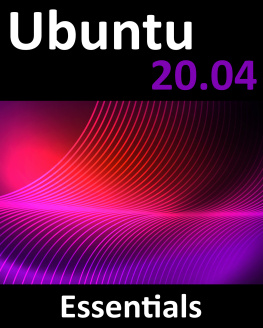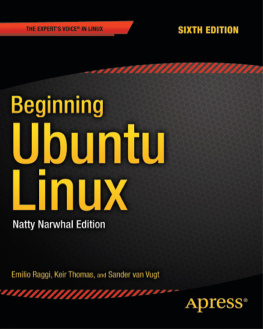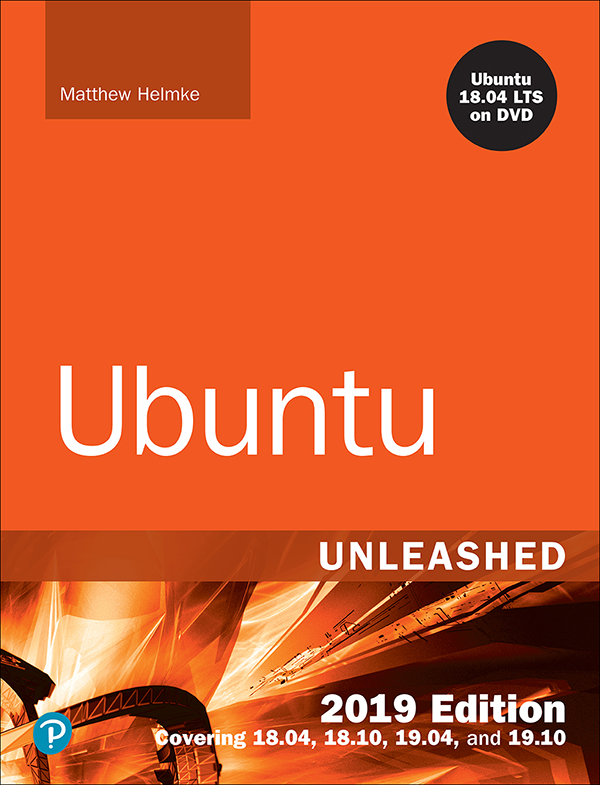Contents
Introduction
IN THIS INTRODUCTION




W e are pleased to present the 2019 edition of Ubuntu Unleashed. Ubuntu is a Linux-based computer operating system that has taken the world by storm. From its humble beginning in 2004, Ubuntu has risen to become a perennial favorite for desktop Linux, as well as a popular choice for servers.
Ubuntu descends from one of the oldest and most revered Linux distributions, Debian. Debian is assembled by a team of talented volunteers, is one of the most stable and customizable distributions of Linux, and is well respected for its quality and technological prowess. It is, however, an operating system for geeks; the bar for entry into the Debian realm is set high, and its user base tends to be highly proficient and expects new users to learn the ropes before joining in. That is both appropriate and okay.
Ubuntu has leveraged the quality of Debian to create an operating system that ordinary people can use. This doesnt mean that Ubuntu users are not technologically proficient, just that they do not have to be. In fact, many talented and respected software developers love Ubuntu because it enables them to concentrate on their specific interests instead of the details of the operating system. This book is for these people and for those who aspire to join their ranks.
If you are new to Linux, you have made a great decision by choosing this book. Unleashed books offer an in-depth look at their subjects, helping both beginner and advanced users move to a new level of knowledge and expertise. Ubuntu is a fast-changing distribution that has an updated release twice a year. We have tracked the development of Ubuntu from early on to make sure the information in this book mirrors closely the development of the distribution. A full copy of Ubuntu is included on the enclosed disc, and it is possible for you to install Ubuntu from that disc in less than an hour!
A QUICK WORD ABOUT MARKETING
Almost all of the content in this book applies regardless of what Ubuntu release version you are using, as long as it is reasonably current. The book has been written to try to focus on information that is useful for the longest amount of time possible. Some chapters, like those covering installation or the basics of the default Ubuntu graphical user interface, will have their information change frequently. These chapters are the exception. The blurb on the cover of the book about which editions this book covers was added to account for these chapters and to denote clearly when the book was most recently revised.
Do not let the highly technical reputation of Linux discourage you, however. Many people who have heard of Linux think that it is found only on servers, used to look after websites and email. But that is far from the truth. Distributions like Ubuntu are making huge inroads into the desktop market. Corporations are realizing the benefits of running a stable and powerful operating system that is easy to maintain and easy to secure. The best part is that as Linux distributions are improved, the majority of those improvements are shared freely, allowing you to benefit from the additions and refinements made by one distribution, such as Red Hat, while continuing to use a different distribution, such as Ubuntu, which in turn shares its improvements. You can put Ubuntu to work today and be assured of a great user experience. Feel free to make as many copies of the software as you want; Ubuntu is freely and legally distributable all over the world, so no copyright lawyers are going to pound on your door.
Licensing
Software licensing is an important issue for all computer users and can entail moral, legal, and financial considerations. Many consumers think that purchasing a copy of a commercial or proprietary operating system, productivity application, utility, or game conveys ownership, but that is not true. In the majority of cases, the end user license agreement ( EULA ) included with a commercial software package states that you have paid only for the right to use the software according to specific terms. This generally means you may not examine, make copies, share, resell, or transfer ownership of the software package. More onerous software licenses enforce terms that preclude you from distributing or publishing comparative performance reviews of the software. Even more insidious licensing schemes (and supporting legislation, especially in the United States) contain provisions allowing onsite auditing of the softwares use!
This is not the case with the software included with this book. You are entirely free to make copies, share copies, and install the software on as many computers as you want. (We encourage you to purchase additional copies of this book to give as gifts, however.) Be sure to read the README file on the disc included with this book for important information regarding the included software and disk contents. After you install Ubuntu, go to www.gnu.org/licenses/gpl.html to find a copy of the GNU GPL. You will see that the GPL provides unrestricted freedom to use, duplicate, share, study, modify, improve, and even sell the software.
You can put your copy of Ubuntu to work right away in your home or at your place of business without worrying about software licensing, per-seat workstation or client licenses, software auditing, royalty payments, or any other type of payments to third parties. However, be aware that although much of the software included with Ubuntu is licensed under the GPL, some packages on this books disc are licensed under other terms. Those packages are subject to a variety of software licenses, and many of them fall under a broad definition known as open source . Some of these licenses include the Artistic License, the BSD License, the Mozilla Public License, and the Q Public License.
For additional information about the various GNU software licenses, browse to www.gnu.org. For a definition of open source and licensing guidelines, along with links to the terms of nearly three dozen open source licenses, browse to www.opensource.org.
Who This Book Is For
This book varies in coverage from deep to shallow over a wide range of topics. This is intentional. Some topics are Ubuntu specific and are not covered by any other book, and they deserve deep coverage here. There are some topics that every power user really must master. Other topics are things power users should know about so that they understand some history, know some other options, or simply have what they need to be able to listen and participate in further discussions with other technical people without being completely confused.
Some topics, like using the Linux command line, receive deep and extensive coverage because we believe that information to be vital to anyone who wants to be a power user or become a skilled DevOps guru. That topic gets three full chapters.
Other topics get only brief coverage so that people who are interested get a few guideposts to help them continue if they are interested. For example, , Using Popular Programming Languages, describes languages such as Ada and Fortran, along with more than 20 other programming languages. In that chapter, 26 programming languages are covered in about a dozen pages. These are useful topics to some but not topics we would consider vital.






